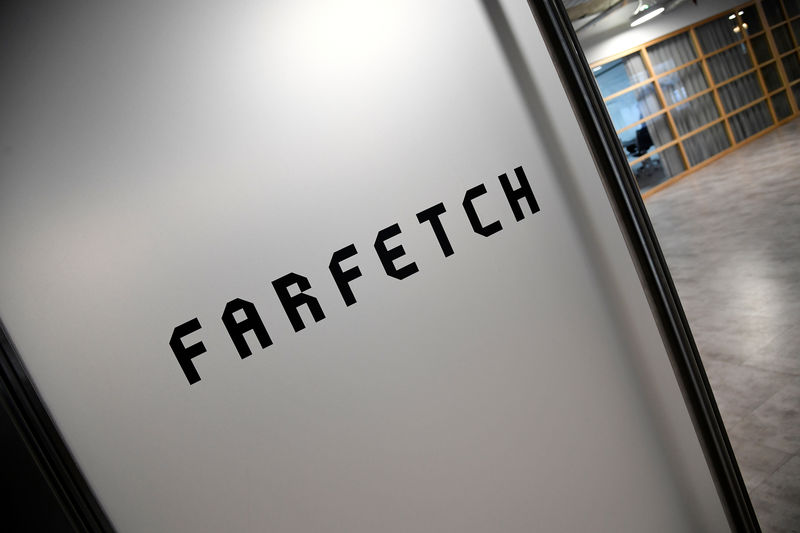By Sarah White and Melissa Fares
PARIS/NEW YORK (Reuters) - Farfetch (N:FTCH) priced its shares above its targeted range on Friday in a New York flotation that values the online luxury retailer at over $5.8 billion and underscores how big a bet web sales have become for high-end brands.
E-commerce is emerging as one of the biggest growth drivers for luxury labels initially fearful of diluting their image by selling online.
London-based Farfetch - a 10-year-old site that connects shoppers to hundreds of boutiques and fashion labels but carries no inventory - is one of a clutch of rapidly-expanding multi-brand platforms that got an early foothold in the market.
The company's shares were trading as much as 39 percent above its initial public offering at $20 per share on the New York stock exchange on Friday - surpassing the range of $17 to $19 that already had been increased.
It will raise $885 million in the listing, with the company issuing 33.6 million new shares and existing shareholders, including early backers such as Advent Venture Partners and Vitrurian Partners, selling 10.6 million.
The IPO values Farfetch, founded by Portuguese entrepreneur Jose Neves, at $5.8 billion according to the share count available in its latest filings. When including employee share options this would rise to $6.3 billion, the company said.
Existing Farfetch investors include JD.com (O:JD), China's second largest e-commerce firm, which bought extra shares along the listing in a private placement.
The flotation comes at a time of growing competition among independent online fashion retailers and luxury groups rolling out their e-commerce operations, including cash-rich luxury heavyweights like Louis Vuitton owner LVMH (PA:LVMH), which is experimenting with its own multi-brand site.
Richemont (S:CFR), the Swiss conglomerate that owns jeweler Cartier, this year took control of now delisted Farfetch rival Yoox (MI:YNAP) Net-A-Porter, in a deal that valued that platform at 5.3 billion euros ($6.2 billion).
Farfetch - which has never turned a profit, but posted a 59 percent jump in revenues last year to $386 million - drew investment from prominent industry players in its IPO, like the Pinault family that controls Kering (PA:PRTP), the French group behind brands such as Italy's Gucci.
To stand out from the crowd, the platform is investing heavily in technology, including for digital store services it is trialing with France's Chanel, one of Farfetch's big name tie-ups.
"It is an industry that, rightly so, chooses their path and their channels very carefully," said Farfetch Chief Executive Jose Neves, adding that, for most luxury retailers, it is all about brand image, aesthetic and high-end customer service.
"But I think the industry has seen the potential of reaching key demographics like the new millennial customer that thinks digital first. These customers are online - they’re not offline."
Online sales are set to make up a quarter of the luxury industry's revenues by 2025 from just under 10 percent now, according to consultancy Bain, thanks in part to demand from young shoppers in tech-savvy markets like China.
($1 = 0.8493 euros)
"That is an incremental $100 billion opportunity just in online luxury fashion," Neves said. "This is Chapter 2. We want to be a category leader and we want to continue to gain massive share in this space," Neves said.
